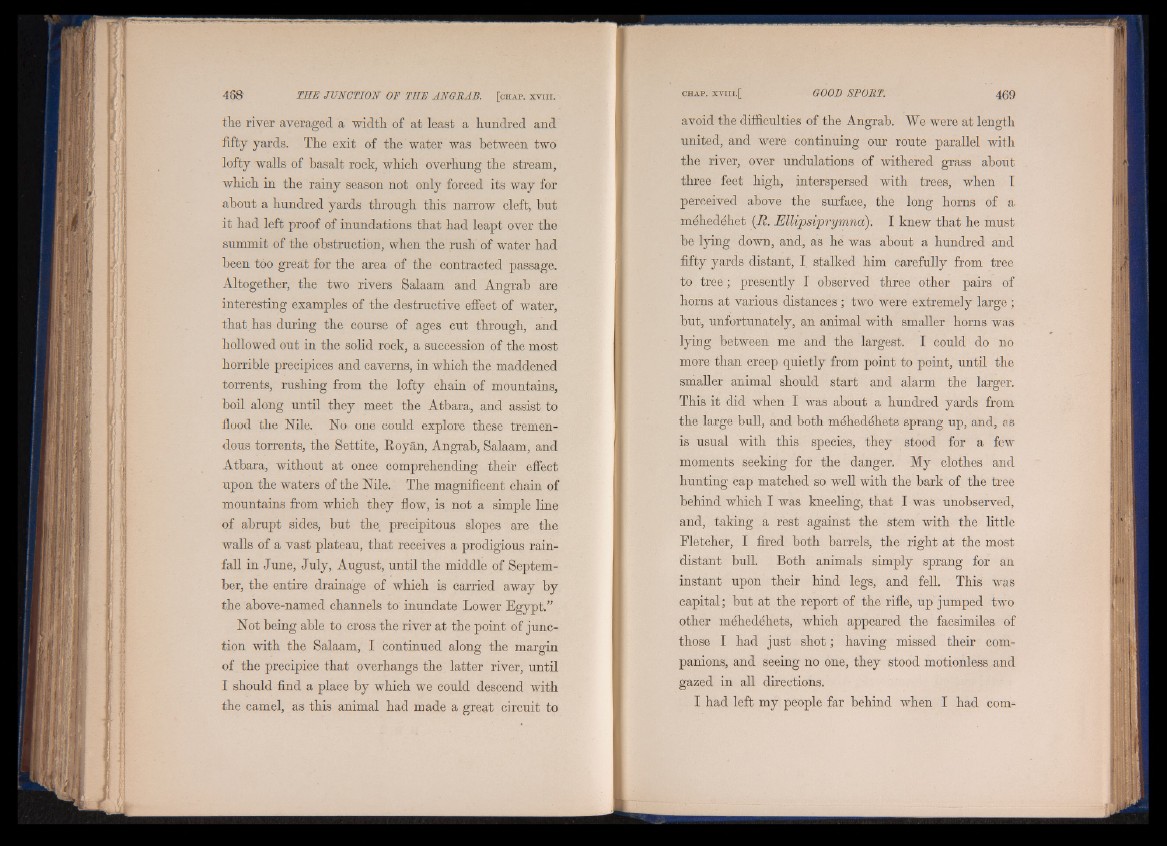
the river averaged a width, of at least a hundred and
fifty yards. The exit of the water was between two
lofty walls of basalt rock, which overhung the stream,
which in the rainy season not only forced its way for
about a hundred yards through this narrow cleft, but
it had left proof of inundations that had leapt over the
summit of the obstruction, when the rush of water had
been too great for the area of the contracted passage.
Altogether, the two rivers Salaam and Angrab are
interesting examples of the destructive effect of water,
that has during the course of ages cut through, and
hollowed out in the solid rock, a succession of the most
horrible precipices and caverns, in which the maddened
torrents, rushing from the lofty chain of mountains,
boil along until they meet the Atbara, and assist to
flood the Nile. No one could explore these tremendous
torrents, the Settite, Royan, Angrab, Salaam, and
Atbara, without at once comprehending their effect
upon the waters of the Nile. The magnificent chain of
mountains from which they flow, is not a simple line
of abrupt sides, but the precipitous slopes are the
walls of a vast plateau, that receives a prodigious rainfall
in June, July, August, until the middle of September,
the entire drainage of which is carried away by
the above-named channels to inundate Lower Egypt.”
Not being able to cros3 the river at the point of junction
with the Salaam, I continued along the margin
of the precipice that overhangs the latter river, until
I should find a place by which we could descend with
the camel, as this animal had made a great circuit to
avoid the difficulties of the Angrab. "We were at length
united, and were continuing our route parallel with
the river, over undulations of withered grass about
three feet high, interspersed with trees, when I
perceived above the surface, the long horns of a
mdheddhet (R. Ellipsiprymna). I knew that he must
be lying down, and, as he was about a hundred and
fifty yards distant, I stalked him carefully from tree
to tree; presently I observed three other pairs of
horns at various distances ; two were extremely large ;
but, unfortunately, an animal with smaller horns was
lying between me and the largest. I could do no
more than creep quietly from point to point, until the
smaller animal should start and alarm the larger.
This it did when I was about a hundred yards from
the large bull, and both mdhed^hets sprang up, and, as
is usual with this species, they stood for a few
moments seeking for the danger. My clothes and
hunting cap matched so well with the bark of the tree
behind which I was kneeling, that I was unobserved,
and, taking a rest against the stem with the little
Fletcher, I fired both barrels, the right at the most
distant bull. Both animals simply sprang for an
instant upon their hind legs, and fell. This was
capital; but at the report of the rifle, up jumped two
other mehedehets, which appeared the facsimiles of
those I had just shot; having missed their companions,
and seeing no one, they stood motionless and
gazed in all directions.
I had left my people far behind when I had com